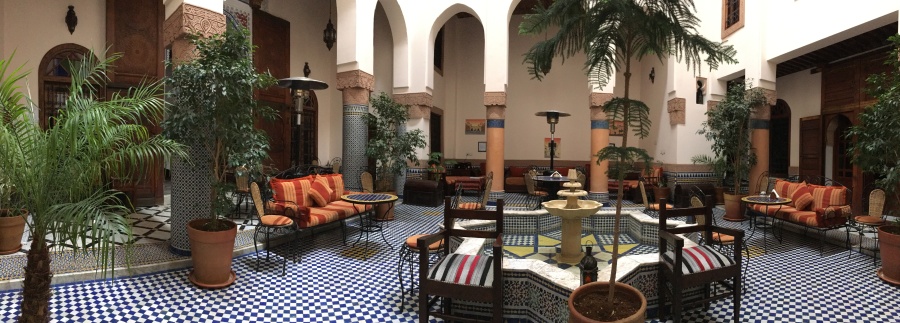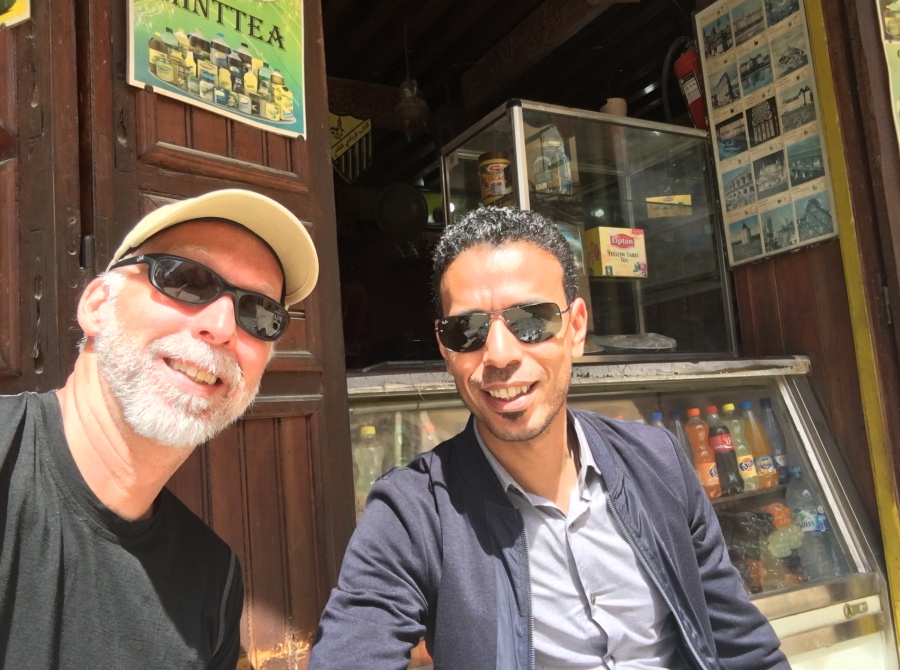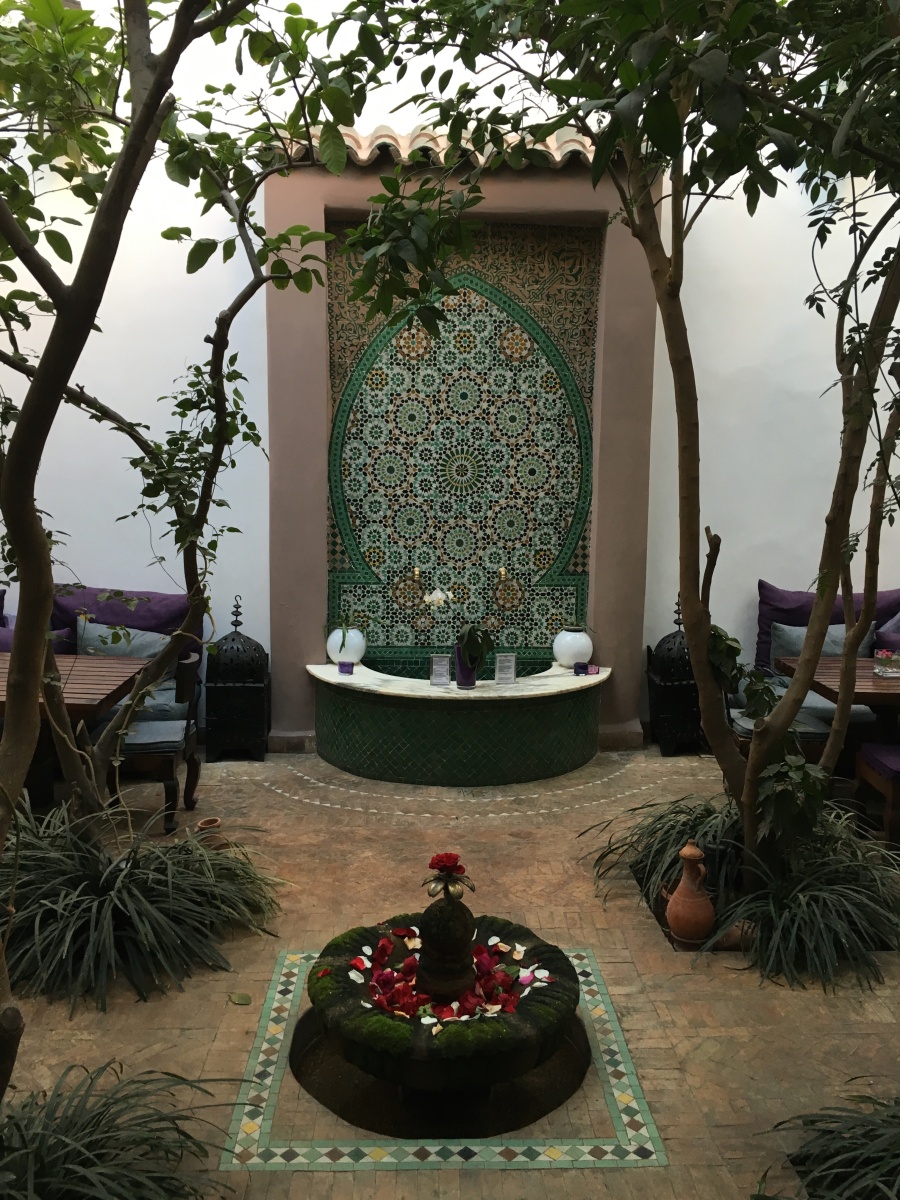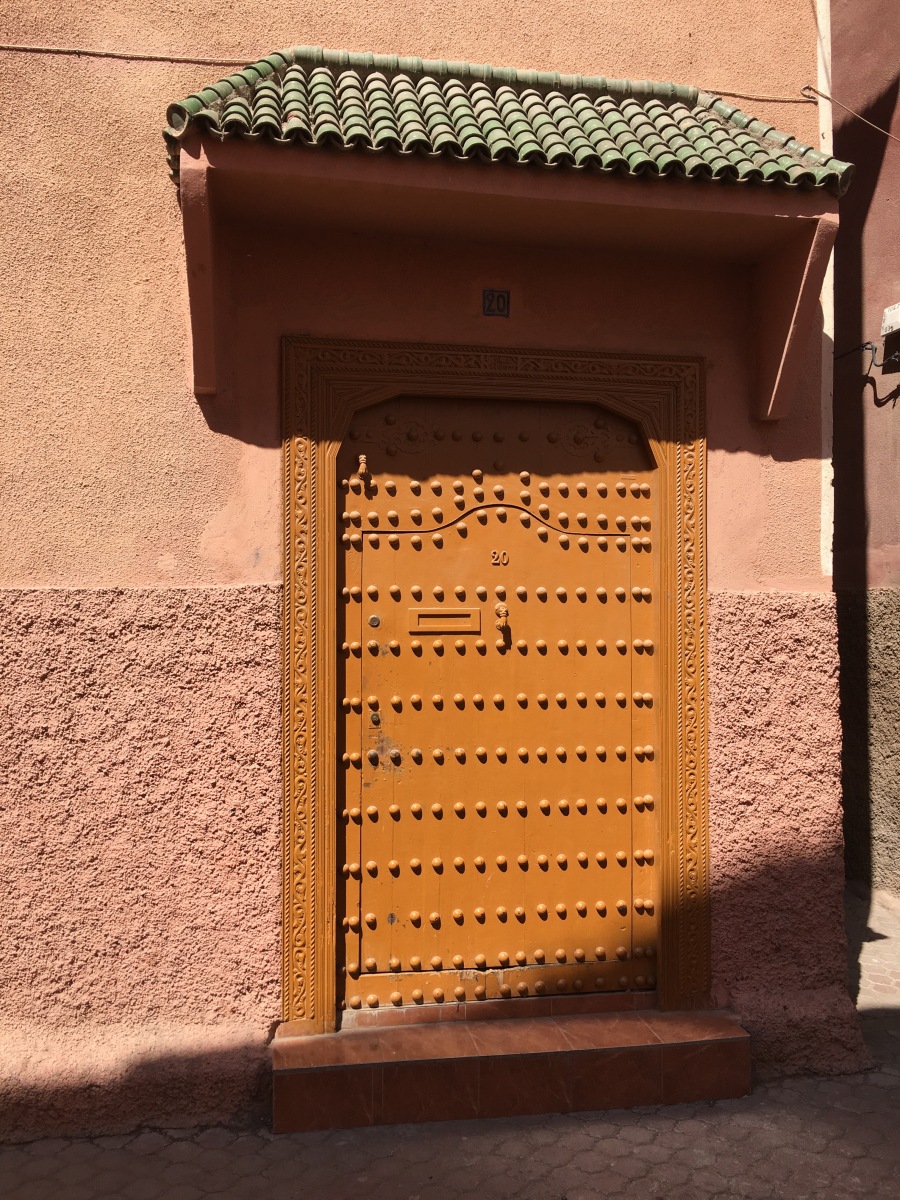Sometimes I like a movie that critics loathe. For instance, I really like the 1987 movie Ishtar. I like it a lot, but if you read some reviews of the film, you might think that I am the only one.
It’s the story of two terrible songwriters (Dustin Hoffman and Warren Beatty) who get a gig performing at a club in Marrakech. En route to Morocco, they pass through the fictional neighboring kingdom of Ishtar, where they encounter an extremely beautiful revolutionary (Isabelle Adjani). That meeting gets the attention of a CIA operative (Charles Grodin). Adventure and hilarity follow.
I thought of Ishtar immediately when Guide Ali asked me, “Why did you choose to come to Morocco?”
But it wasn’t just Ishtar that lured me to Morocco. Combine Ishtar with Lawrence of Arabia and Aladdin and the French Foreign Legion and Paul Bowles’ stories and the Arab Spring and the Moroccan restaurant at EPCOT, and then multiply all of that by my imagination, and that would be the reason that I went to Morocco.
“I’ve always imagined it to be a fascinating place,” I said, deciding to keep it simple.
I flew from London to Casablanca via Royal Air Maroc. The plane was not full–I had an entire row to myself, as did Caroline, the woman in the row behind me. Caroline works in Chad for the United Nations, and we shared some very lively conversation before take-off. I had hopes for more great dialogue during the flight, but once we were in the air, Caroline showed that she is an airplane sleeper of champion caliber. Maybe she really needed some sleep. Maybe the conversation wasn’t as interesting as I had thought.
The next morning I took a train to Fez, where I spent two nights in a riad, a traditional Moroccan palace characterized by a central courtyard with trees and a fountain. The Riad Ahlam in Fez was a wonderful place–beautiful courtyard and rooms, great rooftop terrace overlooking the medina. I slept and ate very well there. Had a nice massage, too.


The courtyard and rooftop terrace at Riad Ahlam.
Guide Mohammed led me through the medina of Fez, the ancient part of the walled city, comprised of souks and narrow lanes made up by the exterior walls of homes, schools, mosques, cafes, workshops, markets, everything. There are no cars or motorbikes in the medina, just pedestrians, carts, cats and donkeys.
We visited a tannery within the medina. When I walked in, a man handed me a batch of fresh mint. “For the smell,” he said, because tanneries are stinky places. The idea was that I could cover my nose with a handful to mint if I couldn’t handle the stench. Minty-fresh hides being sun-dried and dyedGuide Mohammed showed me a lot of interesting places in the medina. Then we stopped for lunch at a local restaurant. The 70-year-old proprietor proudly invited me into the kitchen to choose what to eat. There were two women in the small space working the fires. I tasted everything and then picked a lamb tagine dish.
“The old man has two wives,” Mohammed said.
“Really? Are they the women in the kitchen?”
“No, no. But one of them is sitting over there.” There was a 40-something woman sitting out front, talking with women who walked by. “The other one stays at home,” he said.
“How does that work,” I asked. “Don’t the wives hate each other?”
“No, it works okay. You see, when a woman doesn’t want to have sex anymore, a man who is still active can get a second wife and then leave the first wife alone. That way, everyone’s happy.”
I looked at the spry old man and wondered if he’d be looking for a third wife someday.

Grabbing coffee with Guide Mohammed
Early the next morning I climbed into an SUV with Guide Ali. On our way to the Sahara we we passed through a cedar forest where we encountered some Barbary Apes (cool name for the local monkeys). When I visited the travel clinic before my trip started I was offered a rabies vaccine. I declined, thinking, “I’ll just stay away from animals.” But monkeys that love peanuts are irresistible. You can see me rolling the rabies dice by clicking here.
After monkey-time, Guide Ali and I stopped for lunch. Camel was on the menu, an intriguing option, though it seemed to me to be in bad taste to eat camel when I expected to be riding one in a few hours.
I went with the chicken tagine.At the edge of the Erg Chebbi Sand Dunes (the highest in North Africa), Guide Ali handed me off to the young bedouin Berbers who would host me and about 15 others (American, French, Australian, German and Brazilian) for the evening. They called me Ali Baba. We climbed on camels and rode into the desert until we arrived at our campsite. We watched the sun set and had a great Berber dinner. And then our hosts started playing their drums, much to the delight of the Brazilian students in our group, who danced by the fire late into the night.
In the morning we watched the sun rise and shared breakfast before riding our camels back to the edge of the desert, where Guide Ali was waiting for me. Over the next two days he showed me casbahs (fortresses), oases, canyons and mountains. We also drank a lot of tea. At one point, Guide Ali introduced me to some members of his family. We found his uncles and cousins sitting in some shade, tending some goats in a walled compound along the road. Moroccan tea is usually served in what I call a juice glass. I watched as Guide Ali’s uncle used a small portable stove attached to a propane tank to boil water, and then he poured a small amount into each glass. He swished the water around in each glass and then dumped it. It took me a few moments to realize that I was watching him wash the glasses that we would soon be using. I looked around at my hosts and the goats and flies, and I thought about the medicine that the travel clinic had given me just in case my digestive system went haywire at a time like this. The tea was loaded with herbs and very flavorful, but I declined a second cup. Me and Ali, having some teaAfter crossing the High Atlas Mountains, Guide Ali delivered me to a beautiful riad in Marrakech, where I spent my last two nights in Morocco. Riad Houdou was a beautiful place in the city’s medina. Great room, great food, wonderful rooftop terrace, nice massage. The riad was owned by two Frenchmen, Eric and Didier, who moved to Morocco to become innkeepers. They were very hospitable and friendly.

Central courtyard at Riad Houdou
Guide Abdullah showed me around the medina of Marrakech. It had a different feel than the Fez medina. The passageways and streets were wider and busier and louder, full of motorbikes. Guide Abdullah said that there were over 900,000 motorbikes registered in Marrakech. You can click here to see and hear what it was like when I was walking to Riad Houdou to check in (you’ll see the porter hauling my bag right in front of me).
But Marrakech wasn’t all loud and hectic. Parts of it were very beautiful and peaceful.
From the outside, most of the buildings in Morocco are not very impressive. But once you pass though doors you’ll see fabulous interiors within. And sometimes the doors themselves are interesting. Guide Abdullah pointed out to me that the door below had two separate knockers. He said that they made different sounds. The one in the top left corner was for use only by the husband if he was alone. The center knocker was for everyone else (and the husband if he was not alone). Based on the sound of the knocker, a woman in the house would know whether she needed to cover her head before answering the door.
Morocco is a very different and foreign place.
On my last morning in Marrakech, I boarded a train to Casablanca, where I would get a flight to New York. I figured that if the train arrived on-time, I should have enough time to get from the train station to the airport. In fact, I should have 15 minutes to spare. But things went awry when the train stopped for 45 minutes for unknown reasons. Goats on the tracks, maybe.
To try to compensate for the lost time, I got off the train one stop early and found Taxi Driver Ali. “How much to go to the airport?” I asked.
“300 dirham,” he said. That’s about $30US, an exorbitant fee by Moroccan standards.
“How fast can we get there?”
“25, 30 minutes,” he said.
“I’m late–let’s go.”
Taxi Driver Ali’s cab was about two blocks away. We ran down the street and jumped in his old Mercedes. He drove like a grand prix champ, and I got to the airport in plenty of time. I said, “Ali, you are a great driver. I’m on my way to New York, and when I get back to America, I’m going to tell my family and friends about you. I’m going to tell them about how you got me here so quickly when I was in a jam.”
Ali showed me a huge smile and gave me his card. “Bon voyage, Monsieur.”
Morocco miscellany:
- The food in Morocco was great.
- I asked Guide Mohammed if there was ever any confusion in Morocco because so many men were named Mohammed. “Nicknames,” he said.
- Morocco gained independence from France in 1956, but there’s still a big French influence here. Signs are in both Arabic and French, and French is a second language for most Moroccans. A lot of French businesses and cars are here.
- When one of my Berber hosts in the desert learned I was an American, he said, “AWESOME! THAT’S EXCELLENT!” with exaggerated enthusiasm. He was a comedian.
- When a camel moves from sitting to standing, it straightens its hind legs first. It’s like being on a seesaw with a person who is much heavier than you. I held on tightly.
- Morocco is a travel bargain. Dollars go a long way.
- Guide Ali and I drove through dozens of police checkpoints as we traveled from Fez to Marrakesh. In most every town a group of police officers would be set up on the side of the road, stopping some motorists. We were never stopped, though. Ali said the police rarely disturb tourists.
- Morocco’s constitution guarantees freedom of religion, but the criminal law prohibits conversions to religions other than Islam. Volume-wise, the calls to prayer from mosques were much subtler than in Istanbul and Jerusalem.
- Beautiful weather in Morocco during my stay–70s and sunny. But there was still a lot of snow on the High Atlas Mountains at the end of April.
- Morocco has a king. He has lots of palaces.
- At least four Moroccan men asked me how many wives I had. They were comedians.
- I didn’t meet any beautiful revolutionaries or CIA agents in Morocco, but I did have a wonderful time there. It’s a beautiful country.
















Worth the wait! I think my short visit didn’t do the country justice.
LikeLiked by 1 person
Glad to hear from you Scott, getting a little worried. What an amazing adventure you are on. The memories will last a life time. ( nothing like stating the obvious )
Hope we get to meet up in the near future.Jim
LikeLiked by 1 person
Loved reading of your adventures, Ali Baba. What an amazing trip! Keep us posted on your next adventure. Maybe you’ll need a couple porters to help?
LikeLiked by 1 person
You are a true adventurer, Scott… even without meeting any revolutionaries or CIA spies!
LikeLiked by 1 person
Thought you were home for awhile. I was surprised and delighted by this wonderful post. Morocco is going on my list.
LikeLike
Beautiful photos!!
LikeLike
Dear Ali Baba, (I hope that I may call you that as well; I like it. Your facial hair sells the name. And now that you are Ali Baba, you may have to return and get one of those (magic) carpets you passed on many weeks ago),
Yes, you do like movies that lots of critics pan. And that lots of people pan. In fact, many people find your taste in movies quite questionable. But not I, my friend, not I. We have ventured from C.H.U.D. to Earth Girls Are Easy, and many cinematic places sideways and beyond. I’ve enjoyed those journeys. And I enjoy, through the magic of the Intertron, the journey you are currently on. You needn’t invoke Lawrence of Arabia to help explain your attachment to Morocco. Let it be unapologetically all about Ishtar. All about seeing things that other people don’t. That’s one of your beauties, my friend.
I just moved Ishtar to the top of my Netflix queue (from position 471) and found my unread copy of The Sheltering Sky in the garage (purchased when I was in college in Philly) and put it back on the bookshelf. I hope we can discuss it all when I see you again this summer.
Stay well,
M
LikeLiked by 1 person
I watched Ishtar again this morning. Really.
LikeLiked by 1 person